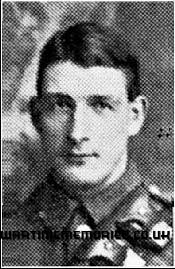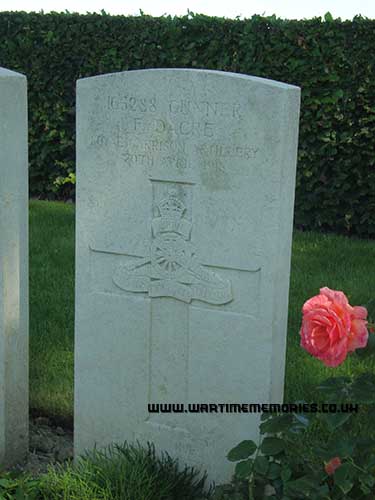Additions will be checked before being published on the website and where possible will be forwarded to the person who submitted the original entries. Your contact details will not be forwarded, but they can send a reply via this messaging system.
please scroll down to send a message
Gnr. Frederick Dacre
British Army 202nd Siege Battery Royal Garrison Artillery
from:Barnoldswick
(d.20th April 1918)
Fred Dacre was the second of 7 children born in 1891 to John & Mary Jane Dacre. In the 1900s the family moved from Old Farm, Lower Holker, Cartmel, where John had worked as a farm labourer, to Barnoldswick, a rapidly growing cotton town in search of work in the mills for their children. Fred became a weaver working for H Pickles and Bros at Long Ing Mill. In 1909 at the age of 17 he volunteered as a part-time recruit in the new Territorial Force established to defend the UK in case the Regular Army became involved in a European war. He attested to serve for 4 years in the Territorial Army (6th West Riding Regiment).
After his marriage to Mary Emma Dodgson in January 1912 he continued to work as a weaver. However, instead of volunteering to join the army at the outbreak of war, he became a policeman with the City of Liverpool Constabulary. Though in an exempted occupation, he joined the Royal Garrison Artillery. He served as a gunner in the 202nd Siege Battery for 6 months before he was killed on 20th April 1918 during the German Spring Offensive on the Somme. He is buried in La Neuville British Cemetery, Corbie, the site of a Casualty Clearing Station.
In the In Memoriam column of the Craven Herald of April 1920 Mary Emma Dacre continued to grieve:- Two years have passed since they laid you to rest. In a grave I may never see; But while my life and memory last I will remember thee.
The inscription on his gravestone, chosen by his widow, reads Ever true. Waiting for you
Poignantly, Fred had not long to wait, as Mary Emma died at Morton Sanatorium near Keighley, probably of TB, on 21st March 1921.
Fred Dacre's story in a sense illustrates the patriotic attitudes of the time coupled with the wish to escape the humdrum life of the weaver, first joining the Territorials, then serving as a police constable before enlisting as a gunner. Yet it also serves to emphasize the tragic impact that the loss of every soldier had on every family. Did Mary Emma indeed die of a broken heart?

